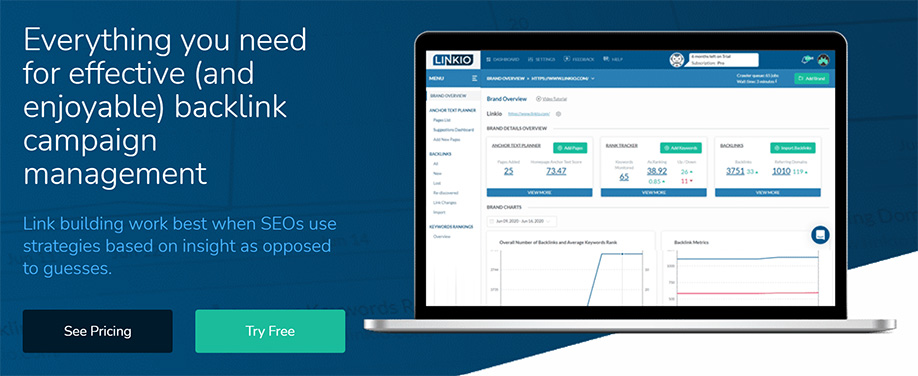
What is SEO Project Management?
Here at SEOptimer we work with over 2,000 digital agencies so we understand the everyday challenges they face. One of the most common challenges is how to manage multiple SEO projects efficiently.
We asked a few digital agencies who are leaders in the SEO industry to help shed light on this topic and share their knowledge and expertise on how they organize SEO projects internally.
We are grateful for the contributions to this article from the following SEO experts:
- Tyson Hinz, COO at WebMarketers
- Laurel Miltner, Director of Digital Strategy at Orbit Media Studios
- John Lincoln, CEO at Ignite Visibility

Managing an SEO project involves juggling many moving parts. For agencies, this job is made all the more difficult because this is being done across several clients at varying stages and levels of complexity.
The more client projects, the more people involved. Things can become disorganized very quickly. This is why you need a solid SEO Project Management framework and process which is systemized.
Any given SEO project may contain up to 8 (!) moving parts or many more:
-
-
- On-page SEO Site Audit
- Fixing on-page SEO issues (eg site speed, broken links, etc)
- Keyword Research
- Ongoing outreach for link building
- Backlink analysis
- Content production
- Blogger/PR outreach
- Existing content optimization
-
A well-documented system will make it easy to scale (add more clients, more projects) and be robust enough that you can induct new team members or interchange team members easily without a large training burden or need for upskilling.
Some options for documenting your SEO project management process include:
- Internal wiki / intranet
- Simple MS Word or Google Docs document
- Process pages within SEO project management tools
Although tools can assist you to streamline and manage all your SEO projects, you still need to start with a solid foundation of processes and a well-documented system for onboarding, running and maintaining SEO projects in your agency.
Why is SEO Project Management Important?
The principles behind effective SEO Project Management are the same as general project management:
-
-
- Utilize a formal project structure
- Define project scope, objective and goals
- Set roles, responsibilities and expectations
- Identify risks and roadblocks
- Maintain ongoing communication
- Measure progress
-
'Communication' is listed separately in principle #5 but it's also the essential ingredient in all principles. It's the glue that keeps your project on track and ensures nothing falls through the cracks.
SEO Project Management tools can help to systemize your task communication but you also need processes for how you keep clients up to date and convey a sense of weekly / monthly progress towards goals.
Structuring and Managing Your SEO Team
There are several ways to structure your team for effective SEO project management. As you take on more client projects, workflows become more complicated as the moving parts mentioned above become three-dimensional and multiple for every project.
As you grow, project tasks can be forgotten or deadlines can be missed. This is where project visibility is key to ensure everyone on the team can see every project and all individual tasks.

John Lincoln, CEO of San Diego-based digital agency Ignite Visibility believes keeping team size lean and mean is the way to go.
"When it comes to SEO team structure, too many people in the kitchen is an issue. The more people engaged – especially if they are inexperienced – the harder it becomes to get things done."
Your team size and structure should reflect the expertise you need for the number of projects you have. For most agencies, their first SEO hire will likely be an SEO Director or SEO Manager.
This individual will be tasked with 'running' SEO projects and defining the agency's processes and methodologies. It goes without saying that this hire is crucially important as they set the standard for how SEO work is done.
As the team expands, it's usually this SEO Director who is influential in the decision making of the next hires. So how do you make sure you hire the best SEO Director possible? Funnily enough, Google themselves have a viewpoint on this:
They recommend the following 3-step process:
1. The Interview
During the interview, listen carefully to how the candidate talks about how they'd fulfil the role, ie: are they overly fixated on rankings or are they more holistic and talk about how SEO helps achieve clients' overall business objectives?
Google recommends hiring SEO professionals who have proven that they can connect SEO activities and outcomes to tangible business value.
2. The Reference Check
Like any hiring process, checking references is mandatory. But Google suggests after you cover the basics, try to understand how the candidate previously guided those around them (ie: team, peers, clients).
Were their SEO results sustainable? What was the balance between their short term fixes vs long-term strategy? How successfully did they educate/advocate for SEO to be an integral part of their clients' businesses?
3. The Technical Audit
No SEO hiring process would be complete without asking the candidate to submit an SEO audit.
This is your turn to 'be the client' and experience how the candidate evaluates a website and how they communicate any potential issues, tips for optimization and opportunity areas.
With the client's shoes on, ask them what investment (time, money, resource) is needed to improve performance and assess how well they structure their response and connect each piece of work to business value.
To assess their technical audit, check out our Website Audit Checklist as a starting benchmark.
What is the Role of an SEO Project Manager?
The primary role of an SEO project manager is to act as a bridge between various teams—marketing, content, development, and analytics.
This position requires excellent communication skills to ensure everyone is aligned with the project's goals and timelines. The SEO project manager coordinates efforts to ensure tasks are completed on time and within budget.
An effective SEO project manager is also responsible for developing a robust SEO strategy tailored to the business’s needs.
Their strategic planning forms the backbone of all SEO activities and sets the direction for the project.
Another critical responsibility of an SEO project manager is to monitor the progress of the SEO efforts continuously.
They use various tools to track key performance indicators (KPIs) such as organic traffic, conversion rates, and search engine rankings.
Defining Your SEO Project Management Process
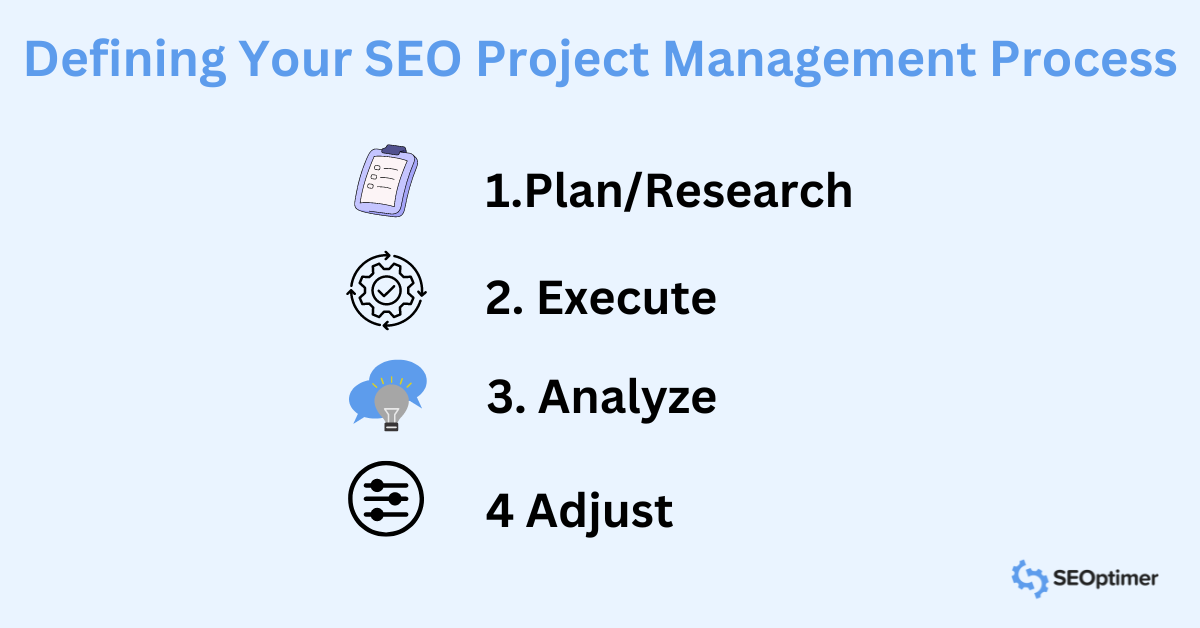
I spoke with Tyson Hinz, COO at Canadian digital agency WebMarketers, who run multiple SEO projects on the go for clients at all levels of digital maturity.
"The key to successfully managing multiple projects at once is to have rock solid methodology and well-implemented work management systems."
Tyson explained WebMarketers methodology for managing multiple SEO projects. The agency use a four-step process:
1.Research/Plan - In the researching phase, they take a deep dive into the analytics and audit clients’ website. Using a variety of tools, we examine the website’s content, structure and performance as well as the competitive landscape.
They identify the best opportunities given the client’s budgets and business goals and break those opportunities into tasks which are put into Workzone, their project management software.
They've found that planning three months of SEO tasks at a time is best as it allows them to more effectively plan longer-term strategies while also giving them the flexibility to change course as needed.
2.Execute - In the second step, they deliver on the tasks planned. Thanks to their thorough research and planning, WebMarketers' SEO team always has a clear view of what needs to be done on any given day.
Whether this is writing blog articles, improving header structure, implementing structured data, or improving page speed, their SEO team is given the time they need to do things right.
3.Analyze - In the analyze phase, they evaluate the completed work and the impact it had on their clients’ websites.
At this point they ask themselves questions such as “did the blog post drive the traffic projected?”, “how effective were the new meta descriptions at improving CTR?”, or “how much were they able to reduce load time after minifying CSS and Javascript”.
This analysis step is crucial, as without it the client’s money might be wasted if you simply push ahead with tasks without checking the impact.
4.Adjust - Once they've analyzed the performance of the SEO plan, they're able to make adjustments as necessary in order to improve results as well as overall processes.
Adjustments are made for a variety of reasons - if something's performing better than expected they might double down on it and/or replicate it where possible.
If these steps seem familiar, that’s because they're based on PDCA, or the Deming Wheel.
While it originated in the manufacturing arena, the four-step management method is just as effective for marketing and is a way to continuously improve processes and get better results.
Continuous improvement is something that every marketing agency should strive for. Not just because it improves outcomes for clients, but also because it enables agencies to refine their processes, eliminate wasted time, and operate more profitably.
 The WebMarketers team at their Ottawa office
The WebMarketers team at their Ottawa office
Bringing it all Together with Project Management Tools
While researching, executing, analyzing, and adjusting is a great way to ensure continuous improvement; on their own it's not enough.
A difficult reality for many agencies to handle is that there's a limited number of hours in a week, as well as a limited number of hands on deck to do the work and analysis required to take the theory and put it into practice.
Tyson's team rely on a workflow management tool to keep everything organized in one place.
"We use Workzone to ensure tasks are not only planned and assigned to the right person, but also that the workload is spread out over and scheduled to be completed before our clients’ billing dates."
With this software, managers are able to view the daily workloads of employees, identify potential problems before they arise, and ensure all SEO projects are on track - no matter how many of them there are.
 Orbit Media Studios team
Orbit Media Studios team
Laurel Miltner is the Director of Digital Strategy at Chicago-based digital agency, Orbit Media Studios and she also relies heavily on processes and tools to handle the agency's SEO project workload.
"Process and documentation have become crucial elements to successful SEO project management at Orbit. It’s important for us to help clients track SEO performance improvements at both a macro (website-wide) and micro (page-by-page and key topics) level."
Unlike most traditional web projects that start and end or have defined dates, most SEO projects are ongoing. Certainly, there are one-off tasks at the start of a project but monthly activities like content creation, outreach and link building are common 'retainer' items.
"Reporting frameworks have to be a part of the process, as well as documenting what was done and when. We start every program and project by asking 'What are we trying to accomplish, and how are we going to track it?'"
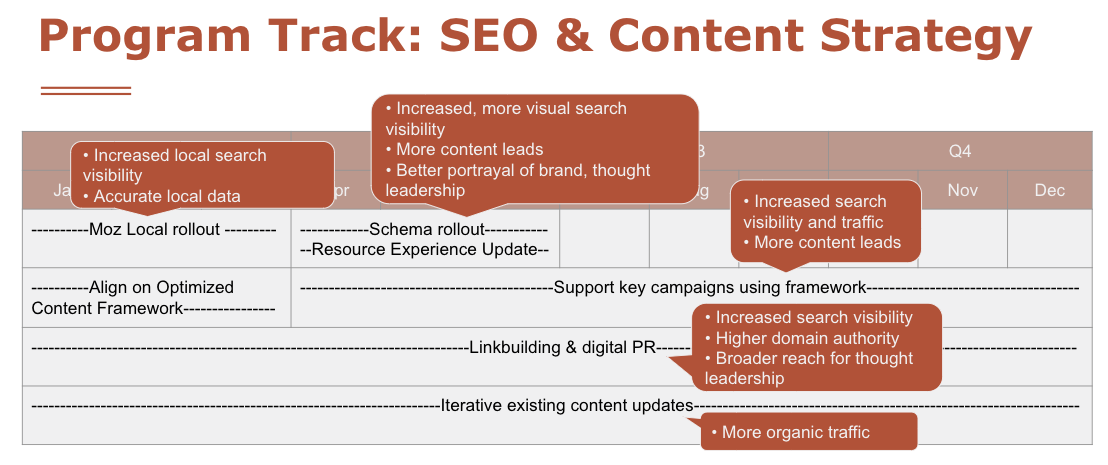 Orbit Media Studios connect SEO tasks to project outcomes
Orbit Media Studios connect SEO tasks to project outcomes
SEO project management tools should help you communicate progress both internally with your team and externally with your clients.
As Laurel mentions, this level of reporting back to the client helps communicate the value your agency delivers back to the client's business.
Common Problems and How to Overcome Them
No Documented Process
Not only does it make each project inefficient and inconsistent but having no documented process means you're having to reinvent the wheel each time and your workflow is reliant on knowledge stuck in people's head - maybe even yours!
The solution: "open-sourcing" your knowledge within your agency makes everything you do scalable. Once processes are documented, you can onboard more people to learn and execute as per your process.
This is the only way to grow efficiently as you onboard more SEO client projects.
Scope Creep and Endless Revisions
SEO Project Management processes can help you organize work internally but they also have a big benefit for helping structure the project and set expectations clearly with your client.
Scope creep is a very common issue facing agencies and can add up to costing thousands over time.
The solution: implement clear expectations for each stage of the project and define revisions and hours if you're billing based on milestones/deliverables.
Lack of Communication
The importance of clear, constant communication can't be overstated. Without good communication, efficiency breaks down which affects timelines, budgets, quality and can be detrimental to the agency-client relationship.
The solution: some project managers say there's no such thing as over-communication.
Using a project management workflow tool below will help automate and coordinate much of the communication in a team so that everyone can see what everyone else is working on and how all the moving parts are related and progressing.
Popular Tools for SEO Project Management
Trello
Trello popularized the "kanban board" whereby tasks are represented on cards. These cards are then organized into columns on a board. Columns typically represent stages of the project (from left to right) but they can be set up any way you want.

In the example of project stages, a card enters the first column on the left and makes it's way across to the right side of the board until it's complete.
Cards can have an array of different attributes including owners, priorities, categories, deadlines, etc. You can attach media and any files to cards to keep things together.
Trello has become popular due to it's simplicity and flexibility. So much so that a whole eco-system of add-on apps has emerged to support Trello users.
For example, Blue Cat Reports provides easy reporting and analytics for Trello so you can understand how cards (aka tasks) are performing throughout your workflow.
Asana
Asana is one of the most popular full-featured project management tools used by digital agencies. Asana's low price-point has helped them succeed in capturing a decent slice of the SEO project management market.
Like Trello, Asana also has a kanban view (or 'board layout' as they call it) but also let's you visualize your tasks in several other ways including the traditional Gantt (or 'timeline view'):
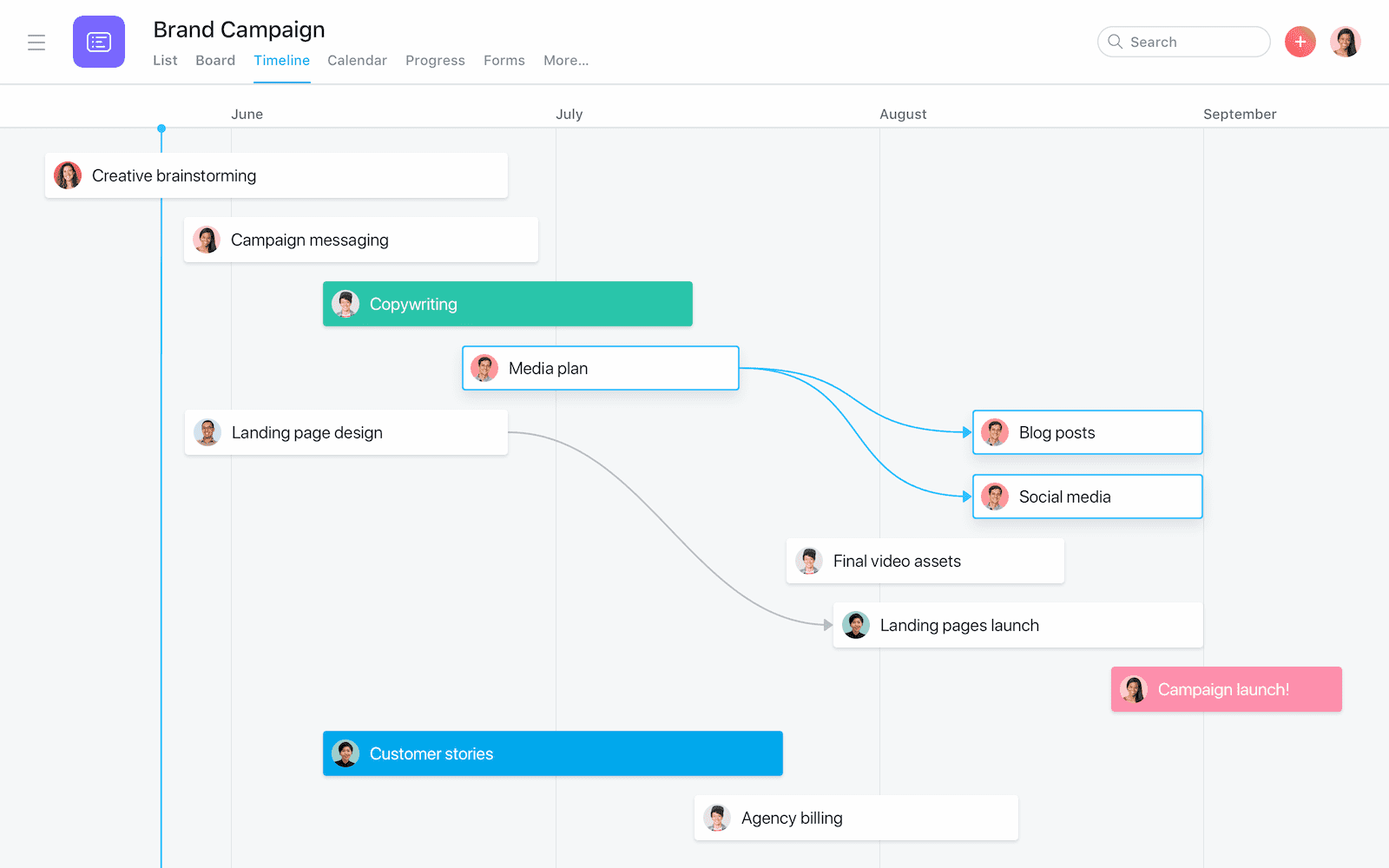
List view:
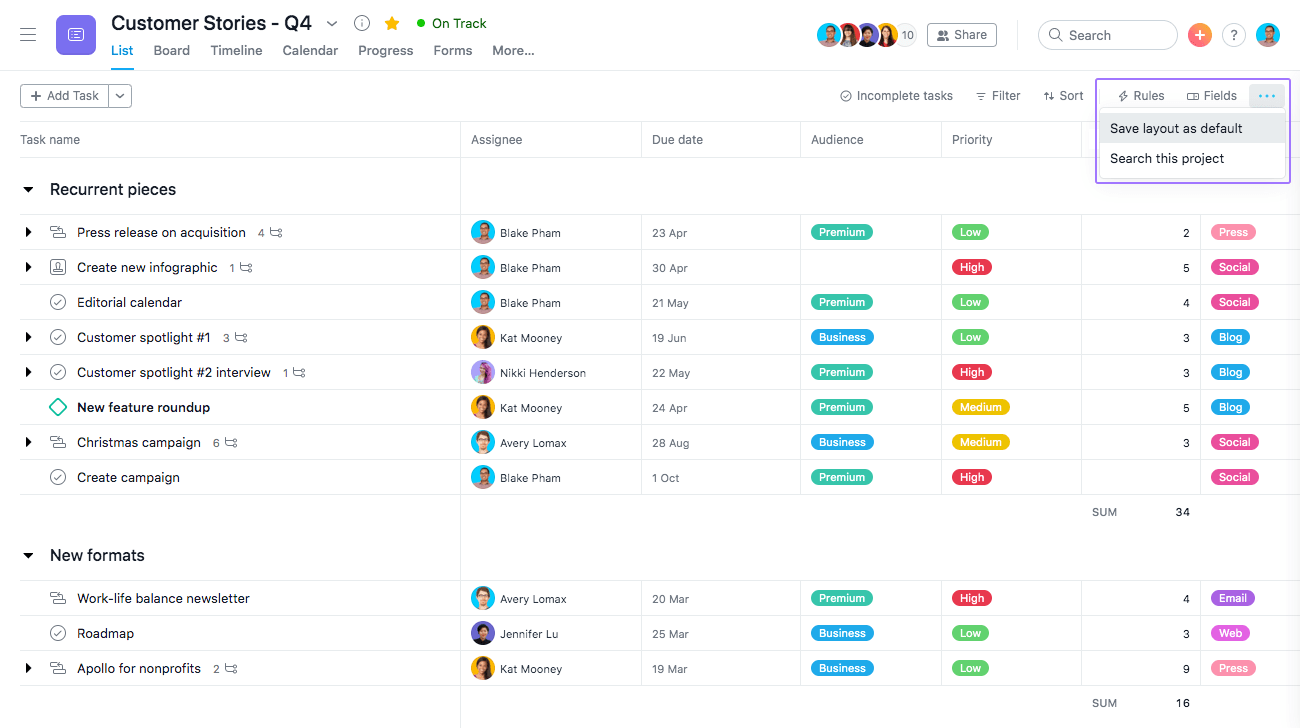
and Calendar view:
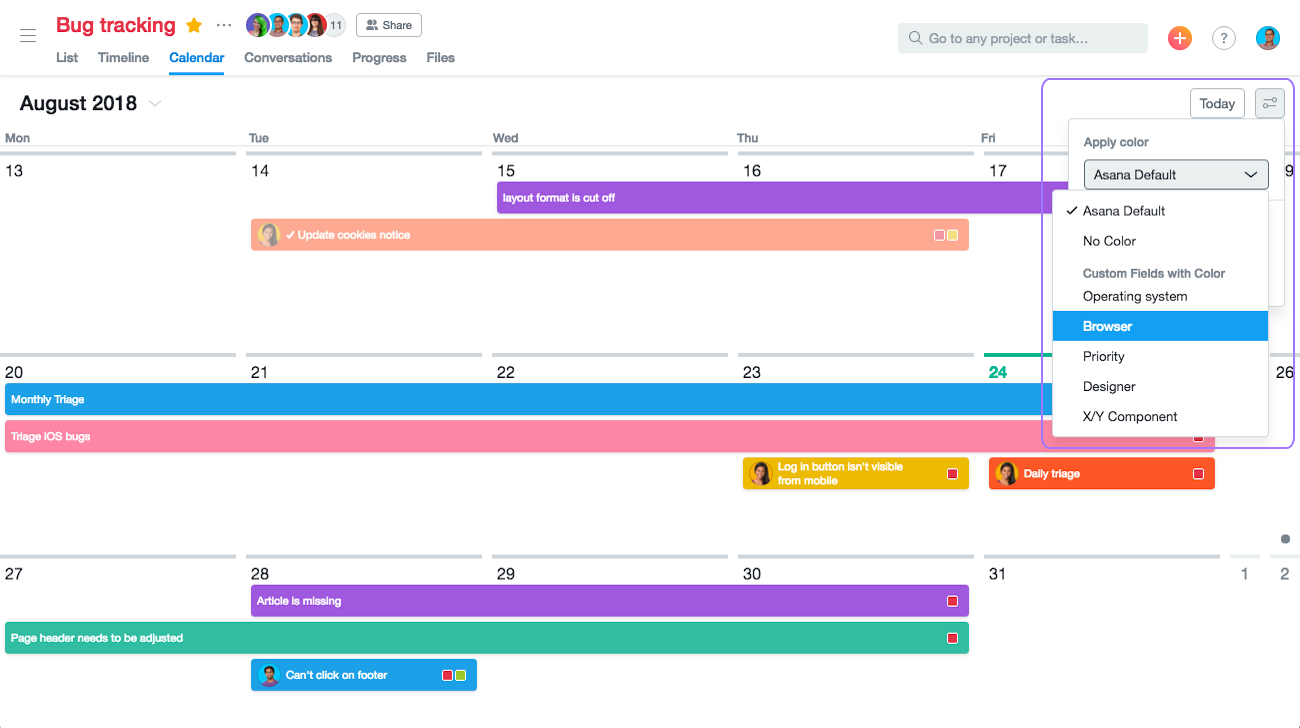
Workzone
Like Asana, Workzone is a full project management suite with many of the same features however its focus is on team-wide adoption.

This is great for large agencies with lots of staff who need to collaborate together. In this situation, the more that Workzone becomes the hub of all comms and tasks, the more project visibility and efficiency the entire agency gains.
Linkio
Linkio specializes in software for managing your backlink campaign management with super useful features for link prospecting and blogger outreach.
Spreadsheet
When all else fails, there's always Excel or Google Sheets (btw, here's a cool hack: type "sheet.new" in Chrome's address bar to instantly create a new Google Sheet).
Spreadsheets are a tried and true method for simple task management and status tracking. Despite the advanced tools above, spreadsheets are still probably the most popular method for SEO project management.
They're simple, familiar and inherently customizable.
If you're starting out in SEO project management, download our free Excel template below:
The Future of SEO Project Management
Increasing Use of AI and Automation
The future of SEO project management will likely see an increasing use of AI and automation.
Tools powered by artificial intelligence can help in keyword research, content optimization, and performance tracking. Automation can streamline repetitive tasks, allowing SEO project managers to focus on strategic initiatives.
Integration with Other Digital Marketing Strategies
SEO project management will continue to integrate with other digital marketing strategies.
Combining SEO with content marketing, social media, and paid advertising can create a holistic approach that drives better results. SEO project managers must be adept at coordinating these efforts.
Frequently Asked Questions
What is the Average Salary of an SEO Project Manager?
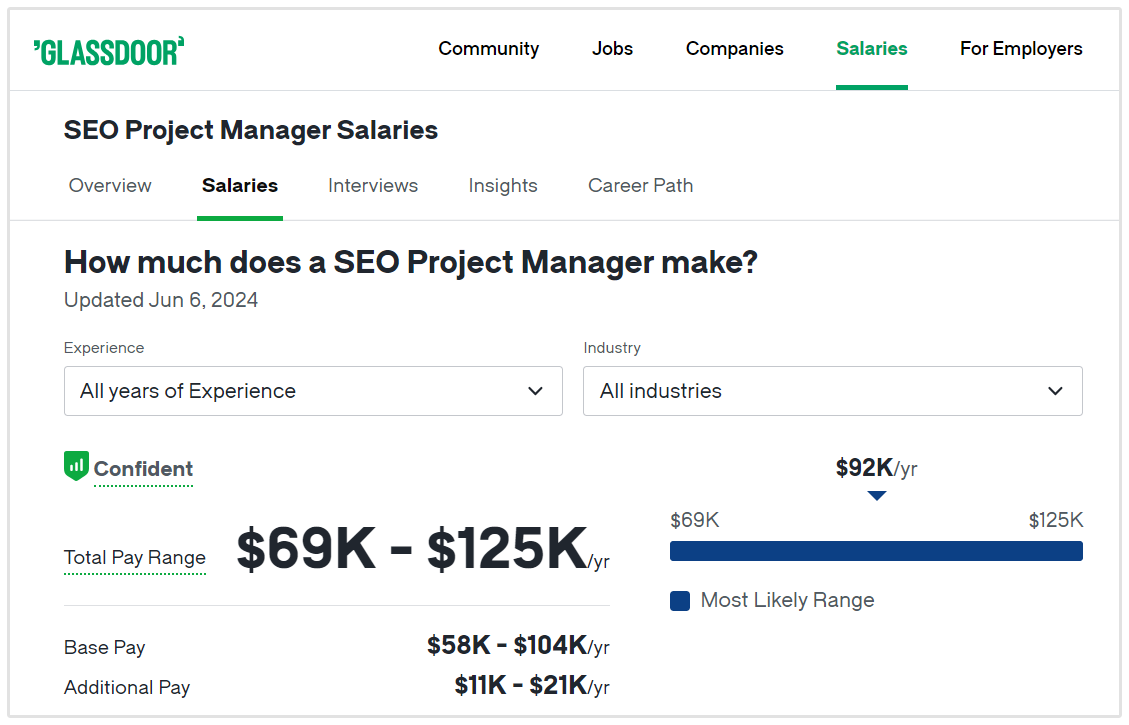
The salary of an SEO project manager can vary widely depending on factors like experience, location, and the size of the company.
On average, an SEO project manager in the United States can expect to earn between $69,000 and $125,000 per year.
However, those with more experience or specialized skills can command higher salaries.
What is an SEO Project Manager?
An SEO project manager plays a pivotal role in orchestrating the integration of SEO strategies across various teams, including marketing, content, development, and analytics.
They are responsible for ensuring seamless communication and collaboration to align SEO with content marketing, social media, and paid advertising efforts, creating a comprehensive strategy that maximizes online visibility and engagement.
Next Steps
We've covered the fundamentals of SEO Project Management in this article and referenced three SEO experts from leading digital agencies in the industry. Now it's your turn to put theory into practice.
If you take away only one insight from these experts it's the importance of communication. Every process and methodology they've put in place across their SEO projects is underpinned by communication both internally and externally.
Workflow tools will definitely help in enabling this communication to take place.
You also need solid documentation to outline how you do things and the steps taken for each task. This helps you scale your services as you onboard more clients. You need to be removing dependencies on people and resources.
If you don't do this, you'll hit bottlenecks in your workflow and start losing efficiency in your work.
But all of the above is irrelevant if you don't have skilled practitioners on your team. The most valuable asset in your agency are your people. Hiring the best from day one will help set you up for success!
If you'd like to share your SEO Project Management tips and hacks, tweet to us with the #seoptimer hashtag.
